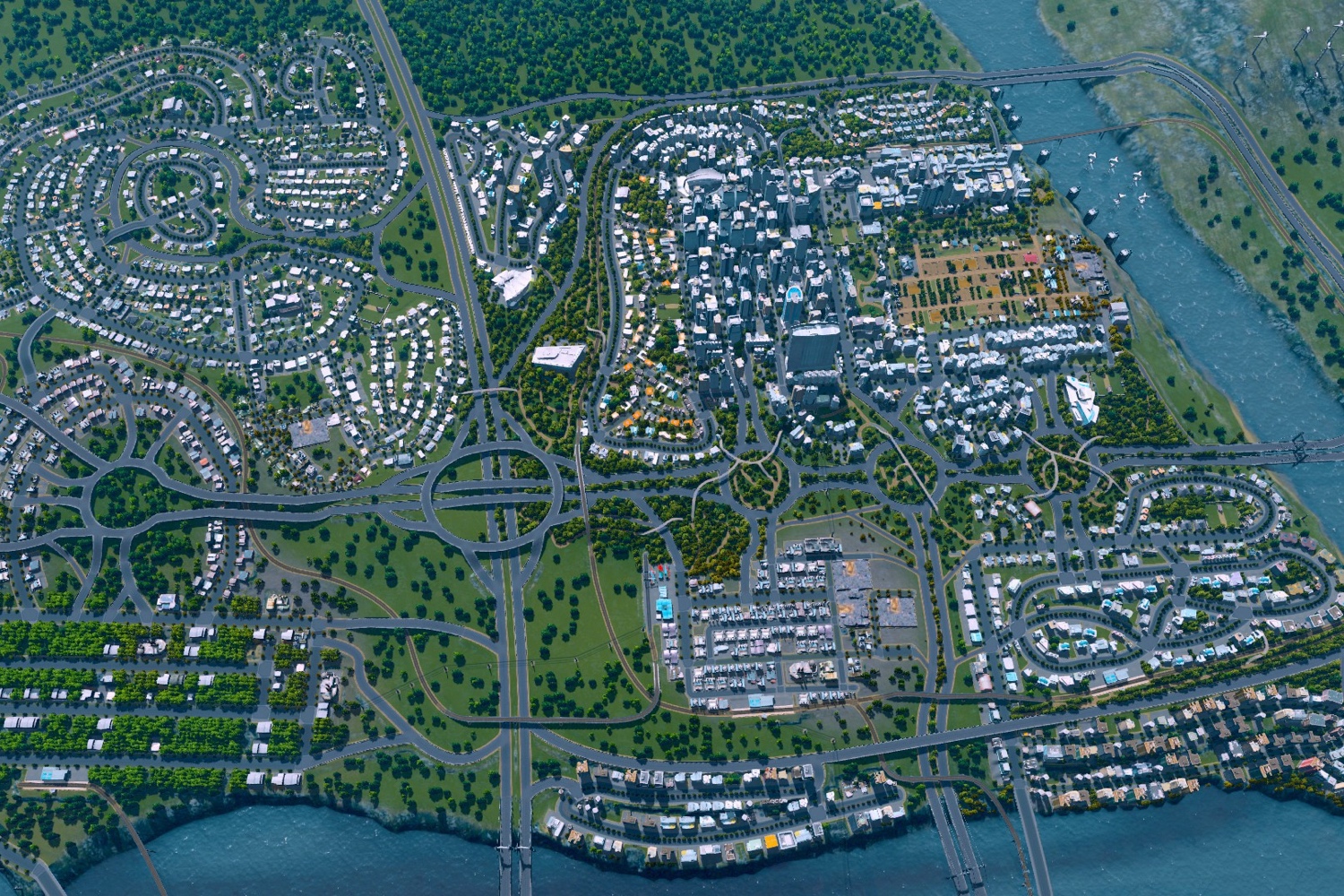
It used to be, the video game everyone played (if they played video games) was SimCity. This was back when PC gaming ruled the roost, and you called computers “desktops” because they actually sat on your desk and doubled as monitor stands. SimCity would eventually fall behind The Sims in terms of sales—now one of the top 10 gaming franchises in history. But for most of 1990s and early 2000s, SimCity was one of those series folks who’d never identify as gamers might, if you brought up gaming in conversation, cop to playing obsessively.
Over the last decade, the “sim” aspect of SimCity has vectored off toward steadily fuzzier, un-simulation-like pastures. Blame the success of The Sims, or the presumption that softer, friendlier, social-angled gameplay is some sort of Platonic gaming ideal. Whatever the reasons, by the time Maxis rebooted SimCity in 2013, the game felt very little like its acclaimed forerunners. You didn’t build cities so much as towns, monitored abstract symbols and color bars in lieu of meaningful metrics, and Maxis’ stumbling conflation of mandatory online play with a bunch of glitchy, not-ready-for-primetime servers — many couldn’t play the game at all, prompting Amazon to yank it from their e-shelves — wound up alienating hardcore and casual players alike.
Enter Cities: Skylines, a PC game by a totally different studio (interlopers!) that’s singlehandedly revitalizing the city-building genre. And not in a “Look, here’s something more clever than SimCity!” way, so much as a “Hey, why not just do SimCity old school?” one. Here’s a look at some of the reasons why.
It’s an unapologetic city-building simulation
“[Developer] Colossal Order delves deep into what Maxis and EA once made so popular with a traditional city-building approach,” writes GameSpot. “Few surprises or even significant innovations can be found here: There is just a standard single-player mode of play in which you choose from a handful of maps representing territory types ranging from flat plains to tropical beaches. You may also play the game with standard conditions, dial up the difficulty, and/or turn on sandbox and unlimited-money mods.”
And it’s ultimately about getting your city’s thoroughfares right
“Each stretch of road, every bus stop, every link in the transport network is important, and even small changes can have meaningful results,” writes PCGamesN, later adding “Everything in Skylines starts with a road. The very first thing you do is drag out that first stretch of tarmac from the highway, the first little piece of the city. Eventually that will connect up with elevated intersections, roundabouts, bridges and other roads both small and huge. Everything grows up around them.”
But it’s not overly complex, or byzantine for the sake of bean counting
“In addition to managing the physical aspects of your city, you’ll have to keep an eye on your bank account and supplement it with loans, decide what to budget for various utilities and services, and tweak taxes for residents and business,” observes PC Gamer. “None of this feels deep, simulation-wise—it’s mostly fiddling with sliders and finding a balance between keeping a positive revenue and annoying residents with steep taxes—but nothing about Skylines’ simulation feels terribly deep, at least economically, and apart from focusing on specific types of industries, or choosing office towers over factories, none of my cities have felt particularly specialized. That suits me just fine, though players looking for a deeply complex city simulation might be a little disappointed.”
Rejiggering your cities isn’t a pain in the butt
“[This] is arguably the heart of Cities: Skylines, which does a fine job making urban renewal as painless as possible,” writes Quarter to Three. “Because so much of the gameplay is premised on the traffic model, Colossal Order knows you’re going to have to widen streets, or put in subways, or deal with railways intersecting roads. So it gives you plenty of smoothly implemented options for one-way traffic, elevated roads, public transportation routing, and especially moveable service buildings. I can’t emphasize enough what a game changer it is that you can relocate an expensive university or hospital instead of having to demolish and rebuild it.”
And the game supports mods that already remedy potential annoyances
“Citizens will let you know what they think of your mayoral skills through the social network Chirper, with new ‘chirps’ appearing under the blue bird logo either criticising or praising your work,” explains God is a Geek. “Despite its helpfulness, this bird can get bloody annoying at times – especially when your population has expanded into the thousands and everyone wants to get their two-pence in. Unfortunately, the option to break the birdie’s neck isn’t available in the base game but mods are already available to combat this incessant feather vertebrae and turn him off completely. Hooray for the internet.”
More Must-Reads from TIME
- Cybersecurity Experts Are Sounding the Alarm on DOGE
- Meet the 2025 Women of the Year
- The Harsh Truth About Disability Inclusion
- Why Do More Young Adults Have Cancer?
- Colman Domingo Leads With Radical Love
- How to Get Better at Doing Things Alone
- Michelle Zauner Stares Down the Darkness
Write to Matt Peckham at matt.peckham@time.com